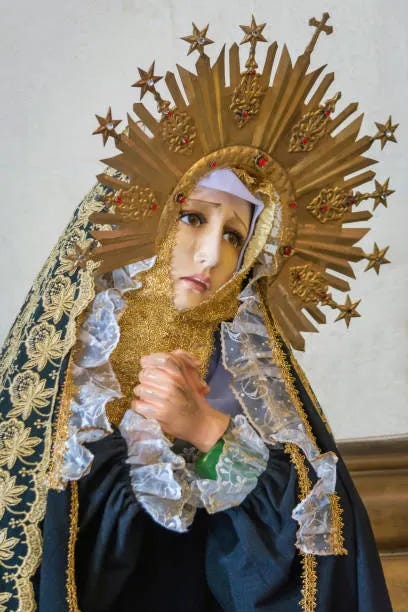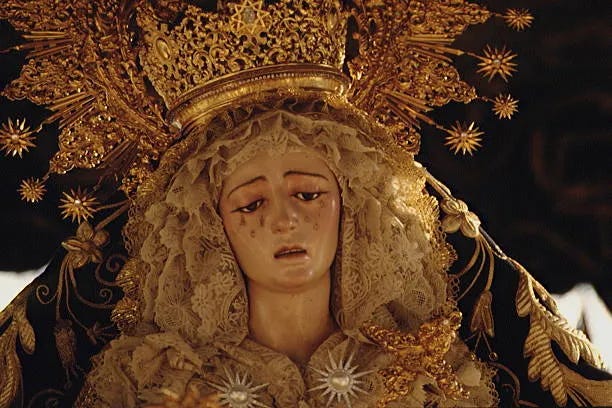We continue our 9 day Novena to Our Lady of Sorrows which commenced on the Feast of Our Lady of Sorrows and will conclude on Holy Saturday. We are praying for the following intentions:
The repose of the soul of the recently deceased, Fr. Paul Mangiafico
reparation for all blasphemies against Our Lord in the Blessed Sacrament
reparation for all blasphemies against the Blessed Virgin Mary
The Feast of the Seven Sorrows in September is devoted to all of her Seven Sorrows; the feast today focuses more specifically the last four of those -- i.e., on what she suffered during Passiontide. In other words, the feeling of the day is akin to what one feels when looking at Michelangelo's Pieta: we imagine Our Lady watching her Son enduring His betrayal, His arrest, His torture, His crucifixion, His death, and His burial.1
Most Blessed and afflicted Virgin, Queen of Martyrs, who didst stand generously beneath the cross, beholding the agony of thy dying Son; by the sword of sorrow which then pierced thy soul, by the sufferings of thy sorrowful life, by the unutterable joy which now more than repays thee for them; look down with a mother’s pity and tenderness, as I kneel before thee to compassionate thy sorrows, and to lay my petition with childlike confidence in thy wounded heart. I beg of thee, O my Mother, to plead continually for me with thy Son, since He can refuse thee nothing, and through the merits of His most sacred Passion and Death, together with thy own sufferings at the foot of the cross, so to touch His Sacred Heart, that I may obtain my request,
Here pause and name the favours which you are asking Our Sorrowful Mother to obtain for you through this Novena. (Let your secondary intention be to pray for the intentions of all the people making this Novena})
For to whom shall I fly in my wants and miseries, if not to thee, O Mother of mercy, who, having so deeply drunk the chalice of thy Son, canst most pity us poor exiles, still doomed to sigh in this vale of tears? Offer to Jesus but one drop of His Precious Blood, but one pang of His adorable Heart; remind Him that thou art our life, our sweetness, and our hope, and thou wilt obtain what I ask, through Jesus Christ our Lord. Amen.
Hail Mary, Virgin Most Sorrowful, pray for us (seven times)
Matthew 26:6-15
And when Jesus was in Bethania, in the house of Simon the leper, There came to Him a woman having an alabaster box of precious ointment, and poured it on His head as He was at table.
And the disciples seeing it, had indignation, saying: To what purpose is this waste? For this might have been sold for much, and given to the poor.
And Jesus knowing it, said to them: Why do you trouble this woman? for she hath wrought a good work upon me. For the poor you have always with you: but me you have not always. For she in pouring this ointment upon my body, hath done it for my burial. Amen I say to you, wheresoever this gospel shall be preached in the whole world, that also which she hath done, shall be told for a memory of her.
Then went one of the twelve, who was called Judas Iscariot, to the chief priests, And said to them: What will you give me, and I will deliver him unto you? But they appointed him thirty pieces of silver.
Today and during the Sacred Triduum, the Matins and Lauds of the Divine Office are often sung in a haunting service known as the Tenebrae service ("tenebrae" meaning "shadows"), which is basically a funeral service for Jesus. During the Matins on Good Friday, one by one, fourteen of fifteen candles are extinguished in the Church, and the fifteenth candle is hid, representing Jesus hiding Himself away. The congregation is left in total darkness, and in a silence that is punctuated at the end by the strepitus -- a clattering, banging sound meant to evoke the convulsion of nature at the death of Christ. It has also been described as the sound of the tomb door closing.
During the Triduum, the Matins and Lauds readings come from the following day's readings each night because the hours of Matins and Lauds were pushed back so that the public might better participate during these special three days (i.e., the Matins and Lauds readings heard at Spy Wednesday's tenebrae service are those for Maundy Thursday, the readings for Maundy Thursday's tenebrae service are from Good Friday, and Good Friday's readings are from Holy Saturday's Divine Office). Relevant Scripture for Spy Wednesday includes Matthew 26:1-16; Mark 14:1-11; Luke 22:1-6; and John 12:1-8. And read Psalm 54 (55 in Bibles with Masoretic numbering):
In Quito, Ecuador and a small handful of other Hispanic New World countries, a very interesting ceremony once practiced in Seville, Spain takes place. It's called the Reseña (Review) or Arrastre de Caudas (Dragging of the Trains), and occurs during Vespers. Canons process through the town wearing black hooded caps (cappas) with 16-feet long trains, all symbolizing the sins of man. They arrive at the cathedral and prostrate themselves while the archbishop waves over them a large black flag adorned with a great red Cross, symbolizing Christ's washing away of man's sins.2
Wednesday in Holy Week
Morning Meditation
THE SUFFERINGS OF JESUS ON THE CROSS
Jesus on the Cross! O stupendous sight for Heaven and earth of God's mercy and love! To behold the Son of God dying of pain upon a gibbet of infamy, condemned as a malefactor to so bitter and shameful a death, in order to save sinful men from the penalty that was their due! This sight has ever been, and will ever be, the subject of the contemplation of the Saints. O, happy is the soul that frequently sets before its eyes Jesus dying on the Cross!
I.
Jesus on the Cross! O stupendous sight for Heaven and earth of God's mercy and love! To behold the Son of God dying of pain upon a gibbet of infamy, condemned as a malefactor to so bitter and shameful a death in order to save sinful men from the penalty that was their due! This sight has ever been, and ever will be, the subject of the contemplation of the Saints, and has led them willingly to renounce all the goods of earth, and to embrace with great courage, sufferings and death, that thus they might make themselves more pleasing to a God Who died for love of them. The sight of Jesus hanging despised between two thieves made the Saints love contempt far more than worldlings love the honours of the world. Beholding Jesus covered with Wounds upon the Cross, they have held in abhorrence the pleasures of sense, and have endeavoured to punish their flesh in order to unite their sufferings to the sufferings of the Crucified. And in beholding the patience of our Saviour in His death, the Saints have joyfully accepted the most painful sicknesses, and even the most cruel torments that tyrants could inflict. Lastly, at beholding the love of Jesus Christ in being willing to sacrifice His life for us in a sea of sorrows, they have sought to sacrifice to Him all that they had, --possessions, children, and even life itself.
St. Paul, speaking of the love which the Eternal Father has borne towards us, in that, when He saw us dead by reason of sin, He willed to restore life to us by sending His Son to die for us, calls it too great a love. But God, who is rich in mercy, for his exceeding charity wherewith he loved us, hath quickened us together in Christ. (Eph. ii. 4). And in the same way ought we to call the love wherewith Jesus Christ has willed to die for us too great a love. Hence the same Apostle says: We preach Jesus Christ crucified, unto the Jews indeed a stumbling-block, and unto the Gentiles, foolishness. (1 Cor. i. 23). St. Paul says that the Death of Jesus Christ appeared to the Jews a stumbling-block, because they thought that He should have appeared on earth full of worldly majesty, and not indeed as one condemned to die like a criminal upon a Cross. On the other hand, to the Gentiles it seemed a folly that a God should be willing to die, and by such a death too, for His creatures. On this subject St. Laurence Justinian remarks: "We have seen Him Who is wise infatuated through an excess of love." We have beheld Him Who is Eternal Wisdom Itself, the Son of God, become a fool for us, by reason of the too great love which He bore towards us.
And does it not seem a folly for God, almighty and supremely happy in Himself, to be willing of His own accord to subject Himself to be scourged, treated as a mock-king, buffeted, spit upon in the face, condemned to die as a malefactor, abandoned by all upon a Cross of shame, and this to save the miserable worms He Himself had created? The loving St. Francis, when he thought of this, went about the country exclaiming with tears, "Love is not loved! Love is not loved!" And hence St. Bonaventure says that he who wishes to keep his love for Jesus Christ ought always to represent Him to himself hanging on the Cross, and dying there for us. "Let him ever have before the eyes of his heart Christ dying upon the Cross."
II.
Oh, happy is that soul which frequently sets before its eyes Jesus dying on the Cross, and stops to contemplate with tenderness the pains which Jesus has suffered, and the love wherewith He offered Himself to the Father, while He lay agonizing on that bed of sorrow. Souls that love God, when they find themselves more than usually harassed by temptations of the devil and by fears about their eternal salvation, derive great comfort from considering, in silence and alone, Jesus hanging on the Cross, and shedding Blood from all His Wounds. At the sight of the Crucifix, all desires for the goods of this world flee utterly away. From that Cross exhales a heavenly breath which causes us to forget all earthly objects, and enkindles within us a holy desire of quitting all things in order to employ all our affections in loving that Lord Who was pleased to die for love of us.
Isaias foretold that our Redeemer would be a Man of Sorrows. And we have seen him ... despised, and the most abject of men, a man of sorrows. (Is. liii. 2). Now let him who wishes to behold this Man of Sorrows, foretold by Isaias, look on Jesus Christ dying on the Cross. There, nailed by His hands and feet, He hangs, the whole weight of His body pressing on His Wounds in all His members, which are every one of them torn and bruised. He suffers continual and excruciating pains; whichever way He turns, so far from finding relief, His pain but increases more and more, until it deprives Him of life; and thus this Man of Sorrows is condemned by the Father to die of sheer suffering on account of our sins.
What Christian, then, O my Jesus, knowing by Faith that Thou hast died upon the Cross for love of him, can live without loving Thee? Pardon me, then, O Lord, first of all this great sin of having lived so many years in the world without loving Thee. My beloved Saviour, the thought of death fills me with dread, as being the moment when I shall give an account to Thee of all the sins I have ever committed against Thee; but that Blood that I see flowing from Thy Wounds causes me to hope for pardon from Thee, and at the same time, the grace of loving Thee for the future with my whole heart, by virtue of those merits Thou hast earned by so many pains. I give myself wholly to Thee: I will no longer be my own; I desire to do all, I desire to suffer all, in order to please Thee. I will die for Thee Who hast died for me, I will say to Thee, with St. Francis: "May I die for love of the love of Thee Who didst vouchsafe to die for love of the love of me."3
https://fisheaters.com/customslent10.html
https://fisheaters.com/customslent12.html
https://www.religiousbookshelf.com/meditations-and-readings/day/2153-Wednesday-in-Holy-Week.html






